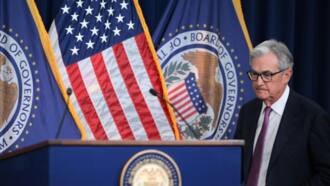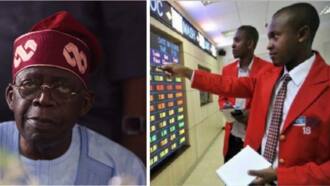CBN Must Develop Policies that Encourage Sustainable Economic Growth, Says Tosin Osunkoya
- Mr Osunkoya has stated that through the increase in interest rates, the CBN aims to mitigate inflationary pressures
- He added that the CBN faces the task of achieving a delicate balance in managing price stability, inflation, and exchange rates
- The CBN's decision demonstrates its commitment to combating inflation and preserving price stability
Unlock the best of Legit.ng on Pinterest! Subscribe now and get your daily inspiration!
The Central Bank of Nigeria must develop policies that encourage sustainable economic growth, says Tosin Osunkoya, Co-Managing Partner and the CEO of Comercio Partners Asset Management.
Osunkoya stated this while reacting to the CBN's recent raise of the Monetary Policy Rate (MPR) to 18.75%, in an effort to curb inflation.
Following its Monetary Policy Committee meeting, the CBN made the decision to increase the MPR by 25 basis points, marking the seventh consecutive increase since April 2022. The new rate supersedes the previous level of 18.50%.

Source: UGC
He also noted that the MPC's decision to raise the benchmark interest rate demonstrates the Committee's concern about the consequences of cost-push inflation.
PAY ATTENTION: Share your outstanding story with our editors! Please reach us through info@corp.legit.ng!
Osunkoya said:
By hiking interest rates, the CBN hopes to alleviate inflationary pressures caused by growing manufacturing costs, which have been contributing to the persistent surge in headline inflation.
The narrowing of the asymmetric corridor around the MPR to +100/-300 basis points is a significant step towards giving more stability to the broader interest rate framework and preventing excessive interest rate volatility.
Osunkoya added that the CBN's recognition of forex supply challenges as a contributing factor to exchange rate volatility underscores the difficulties the forex market is currently grappling with.
He said the situation emphasizes the significance of implementing further reforms aimed at enhancing the FX market's efficiency and fostering increased foreign investment.
The CBN confronts the intricate and challenging task of simultaneously managing price stability, inflation, and exchange rates. Alongside these responsibilities, the apex bank is tasked with formulating policies that foster sustainable economic growth.
It is critical to recognise that reaching all three of these economic objectives at the same time may be a difficult and complex task in the current context. Striking a balance between these demands can be difficult, and a realistic approach is essential to solve these difficulties effectively.
The global financial market expert also told Legit.ng that the broader economic context requires a comprehensive strategy that encompasses structural reforms, fiscal policies, exchange rate management, and initiatives to promote sustainable long-term economic growth.
He however advices investors to exercise prudence and explore a range of options that take into account the complex economic challenges and the evolving regulatory environment.
He said:
Investors should stay cautious and seek diverse options that consider the complicated economic issues and changing regulatory landscape.
Overall, the CBN's decision to hike interest rates demonstrates the central bank's commitment to combating inflation and preserving price stability.
Naira in circulation to reduce as CBN considers curbing money supply
In related news, Legit.ng reported that the members of the CBN's MPC have proposed a decrease in the growth of the money supply to strengthen monetary reserves and enhance the economy's ability to withstand potential future disruptions.
The recommendation follows a revelation by the CBN that the currency outside the banking system had increased to N1.4 trillion in March. This showed a 66% increase from the N843 billion in February.
The rise in circulation is a direct result of the Supreme Court order reinstating the old N200, N500, and N1,000 banknotes until December 31, 2023, which has had a notable impact.
Additionally, the committee acknowledged that exercising control over the expansion of money supply would effectively curb the inflationary pressures that could arise from the recent surge in currency-in-circulation.
Source: Legit.ng



